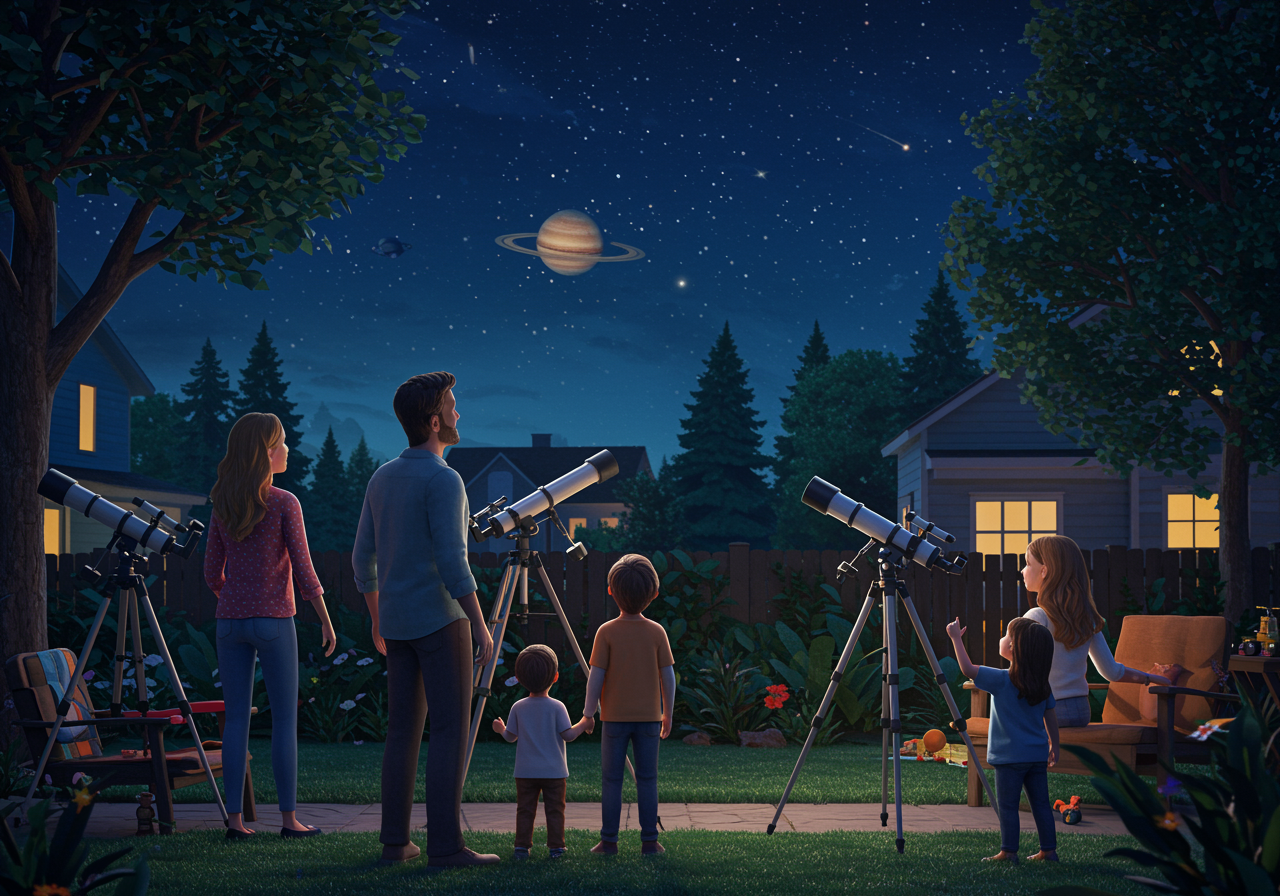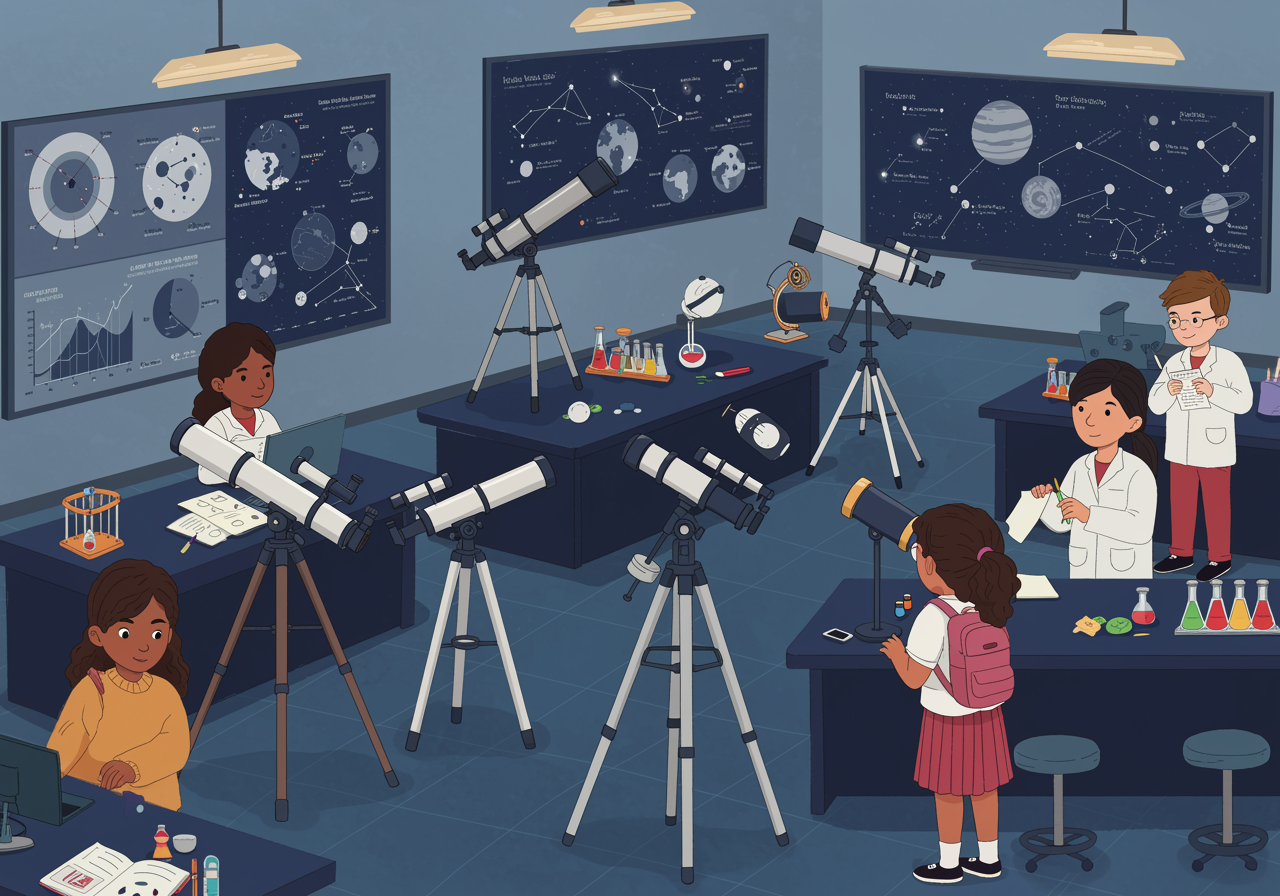The Ultimate Cosmic Treasure Hunt: Why Scientists Never Stop Looking for Space Neighbors

Discover what drives the world’s coolest detectives to search the universe for signs of life
Join the most exciting mystery ever as we explore why brilliant minds across the globe are obsessed with finding our cosmic neighbors.
Overview
Think about the last time your child got completely obsessed with finding something – maybe a hidden toy or the perfect TikTok video. That same burning curiosity drives scientists to search for life beyond Earth, except their treasure hunt spans the entire universe! This cosmic detective story helps kids understand that the same curiosity that makes them wonder "what's out there?" is exactly what powers some of humanity's greatest discoveries. It's a perfect way to celebrate that asking big questions isn't just okay – it's what moves our world forward.

Understand in 30 Seconds
Get up to speed quickly
- It's All About Wonder: Scientists search for life because humans are naturally curious creatures who need to know "what's out there?" – just like kids who peek behind every door.
- We Want to Know We're Not Alone: Finding life elsewhere would answer one of humanity's biggest questions: Are we the only living things in this massive universe?
- It Helps Us Understand Earth: Studying how life might exist on other planets teaches us amazing things about how life works on our own planet.
- The Discovery Would Change Everything: Finding alien life would be like discovering fire or inventing the internet – it would completely change how we see ourselves and our place in space.
Real Life Scenario
Situations you can relate to
Imagine your family moved to a huge new neighborhood with thousands of houses, but you've never seen any other families. Wouldn't you be incredibly curious to know if anyone else lived there? You might look for signs – lights in windows, sounds from yards, or footprints on sidewalks. That's exactly what scientists do with space! They use giant telescopes like super-powered binoculars to peek at distant planets, looking for "lights in the windows" (like oxygen in the air) or "sounds from the yard" (like radio signals). Every day they wake up thinking, "Today might be the day we find our cosmic neighbors!" The excitement never gets old because the discovery would be the most amazing news in human history.

Role Play
Spark a conversation with “what if” scenarios
What if you were the first scientist to discover a signal from space that proved aliens exist?
- Role play: Take turns being the excited scientist calling world leaders and family members with the news. Practice how you'd explain this incredible discovery!
What if you had to convince someone to fund your alien-hunting research?
- Role play: One person plays a scientist passionately explaining why this research matters, while the other asks tough questions about cost and time.
What if you found a planet that might have life, but it would take 50 years to get more information?
- Role play: Debate whether it's worth dedicating your whole career to studying something you might never get a clear answer about.
FAQs
Frequently asked questions people want to know
Haven't scientists been looking for decades without finding anything? Why don't they give up?
Great question! Scientists know that space is incredibly huge – like trying to find a specific grain of sand on every beach in the world. Each "no" gets them closer to a "yes," and new technology makes the search better every year.
What if we find life but it's just boring microbes, not cool aliens?
Even tiny microbes would be HUGE! It would prove life can start in different places, which means there could be more complex life elsewhere too. Plus, all life on Earth started as microbes!
Why spend money looking for aliens when we have problems on Earth?
The technologies we develop for space research often help solve Earth problems too – like water purification systems and medical devices. Plus, finding life elsewhere might teach us how to better protect life on Earth.
Examples in the Wild
See how this works day to day
- NASA's James Webb Space Telescope recently found water vapor in the atmosphere of a planet 700 light-years away, bringing scientists closer to finding habitable worlds (NASA)
- Scientists discovered that Saturn's moon Enceladus shoots water geysers into space, suggesting it might have an ocean under its icy surface where life could exist (JPL/NASA)
- The SETI Institute uses powerful computers to analyze millions of radio signals from space, searching for patterns that might indicate intelligent life (SETI Institute)
- Mars rovers like Perseverance are collecting rock samples that might contain ancient microbial life, which will be brought back to Earth for study in the 2030s (NASA Mars Exploration Program)
In Summary
What you should know before you start
- Scientists search for life because curiosity is a fundamental human trait – we need to know what's out there
- Finding alien life would answer whether we're alone in the universe and help us understand life itself
- The search improves technology and our understanding of Earth while inspiring future generations
- Every day could bring the discovery that changes everything we know about our place in the cosmos
Pro-tip for Parents
You got this!
If your child seems skeptical about spending resources on space exploration, help them see the connection to their own life. Ask them about something they're curious about that might seem "pointless" to others – like learning about dinosaurs or mastering a video game. Explain that adult curiosity works the same way, just on a bigger scale. The key is validating their curiosity while showing how scientific curiosity has led to discoveries that benefit everyone.

Keep an Eye Out For
Find these examples in everyday life
- News about new exoplanet discoveries or signs of water on other worlds
- Movies or TV shows about space exploration and first contact scenarios
- Science museum exhibits about astrobiology or the search for extraterrestrial life
Explore Beyond
Look up these related research topics
- How do we define "life" and what makes something alive?
- What would happen to Earth's religions and cultures if we found alien life?
- How do scientists use math and physics to study things they can't physically visit?